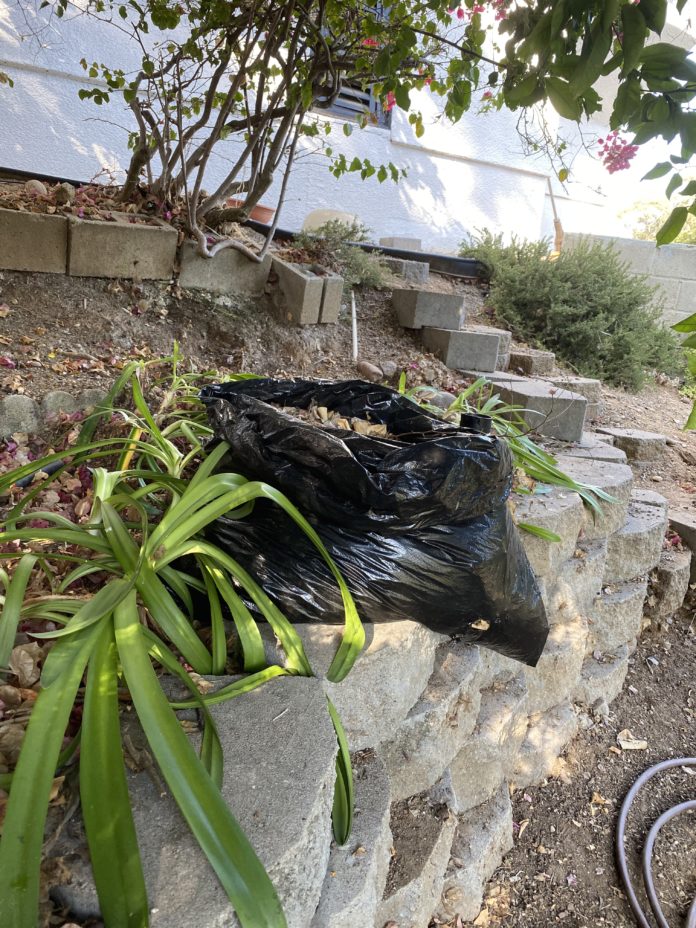Autumn Chores
Spring is not the only time for cleaning; for my family, autumn is more important to take stock. We face fire danger, some flood danger, and maintenance is really important before the appearance of fire or rainy seasons appear.
Much of San Diego’s beauty is due to the lush canyons throughout many of its neighborhoods. However, these canyons also pose an enormous threat to our safety and wellbeing.
At this moment our canyons within the city limits are like fireplaces, awaiting a match to render a cabin or home warm and cozy. In a communication with the city, Andrew Spurgin was quite succinct in his description of the situation: “The canyon literally is a tinderbox. Those big Canary Island Date Palms have been destroyed from the South American Palm Weevils and pose a huge fire hazard.”
In addition, many fir trees have dead or fallen branches, as do the oily eucalyptus trees gracing our canyons. Winter rains encourage grasses to grow, but summer turns them to gold, ripe for a spark to engulf them in flames.
The city purchased many of these canyon lots for open space many years ago. We sold three 25 by100 foot lots to the city. They promised to maintain them as they now belong to the city. They have not done so. Nevertheless, I have forced my 80-year-old carcass into the canyon to pull out grasses growing near our property. I am no longer agile or strong enough to haul out dead tree limbs.
I have filed numerous complaints to the city. My most recent complaint was turned over to the fire department; “Get It Done” doesn’t bother with this. The fire department has come to our house a few times. The department told both Andrew and me they clear the canyons every other year. No one I’ve spoken to remembers anyone doing anything to the canyons in many years. The dead trees, dead debris, brittle branches need only a spark to start a devastating calamity. We must encourage the city to remove these fire hazards before it is too late.
In our household, another important autumn chore deals with the roof. The sun does the most damage to roofs by drying them out and making them more fragile, subject to wearing out more rapidly. A pitched roof is more easily maintained: the water runs off it; worn places or damaged shingles are more easily visible than the condition of a flat roof. However, even a pitched roof needs clean gutters and downspouts to allow water to flow where it ought to go. Our roof is flat. While no roof is completely flat, debris, branches and leaves do collect on it and in any gutters, downspouts, or drains. This means that water may sit on the roof with nowhere to go. Water is heavy. This can eventually cause leaks or even a roof collapse. Luckily, we don’t have snow.
By Thanksgiving our roof, drains, and downspouts will have been cleared. When my husband was younger, he went up on the roof with a broom and a blower. He trod carefully as roofing material is normally not built for foot traffic, which can render it susceptible to leakage. Between the blower and the broom, he cleared the roof and made all water routes clear. Nevertheless, at 80 he has no business up on the roof. Our grandchildren have been given roof-cleaning lessons for several years. This will be their first year solo. And, yes, they are paid since we’d have to pay someone to do it! I hope he has also given them lessons in assessing the health of the roof.
My job is to clear brush from near the house as well as any flammable objects, such as brooms and furniture. Since I am cleaning outside, I try to do a fall purge of the inside as well. This is not as much fun. It involves giving away anything we no longer use that is still in decent condition. Even less fun is purging kitchen cupboards and refrigerator of never to be eaten foods. If they haven’t expired, they can be donated. If I am smart and not too tired, I will clean these storage places while they are somewhat bare.
I must admit that Covid-19 was my inspiration. I purged and cleaned in the spring, but six months later it is needed again. This time it is far less exciting; been there, done that, and I’ll probably have to do it again next spring.
On November 19, Bill Toon will speak about monarch butterflies for the Mission Hills Garden Club. Toon is a multi-talented man who has done much to teach Third World Countries ways to protect the planet. He has followed the migration of monarch butterflies for years, and he is also a woodworker and a car buff. Join us via Zoom. The Mission Hills Garden Club web site has directions for joining the Zoom meetings. No need for a parking place, and you have a chance to ask questions just as you would in person.

Category: Gardening, Local News, Seniors







